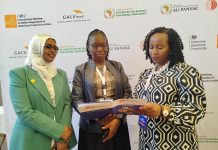By Thuku Kariuki
Nestled in the verdant hills of Bururi province, the Jiji hydroelectric power station hums with promise, a monumental step toward Burundi’s quest for energy independence. When President Évariste Ndayishimiye inaugurated the plant, joined by a chorus of national leaders and global partners, he didn’t just flip a switch—he sparked a transformation.
“2025 marks a new era in Burundi’s energy development. Just as water is essential to life, energy is crucial to development,” President Ndayishimiye said at the inauguration ceremony. “I am convinced that this new source of available energy will enable new businesses to develop and transform production from different sectors.”
The Jiji plant, part of the $320 million Jiji and Mulembwe Hydropower Project, is a game-changer for Burundi. Alongside its soon-to-be-completed twin, the Mulembwe plant, it will deliver 49.5 megawatts of capacity, generating 235 gigawatt-hours of clean energy each year. This isn’t just electricity—it’s a lifeline for 15,000 households, 7,000 businesses, and 1,700 industrial sites. From rural health clinics to budding tech startups and thriving agribusinesses, this reliable power will fuel progress across sectors that form the backbone of Burundi’s economy.
The project’s success is a testament to global collaboration, with funding from the African Development Bank ($22 million), European Investment Bank ($36.6 million), World Bank ($149.4 million), European Union ($95 million), and Burundi’s government and REGIDESO ($16.7 million).
“This is more than infrastructure,” said Hawa Cisse Wagué, World Bank Country Manager for Burundi. “It’s a catalyst for economic and social growth, driving industrialization and job creation.”
Elisabetta Pietrobon, European Union’s Ambassador to Burundi, reinforced this, noting that energy is a cornerstone of development, backed by the EU from design to delivery. The impact is already tangible. Construction of the Jiji plant created hundreds of local jobs, injecting vitality into Bururi’s economy and equipping communities with technical skills.
Now, as power flows, small and medium-sized enterprises are set to flourish, drawing both local and foreign investment. “This plant is a beacon of sustainable prosperity,” said Pascal Yembiline, the African Development Bank’s Country Manager for Burundi, highlighting its role in creating a vibrant, investment-friendly climate.
Jiji’s renewable energy also positions Burundi as a leader in the fight against climate change, cutting reliance on costly fossil fuel imports. Edward Claessen of the EIB emphasized its alignment with the EU’s push for clean infrastructure, a model for sustainable development across Africa.
As Burundi charts its course towards becoming an emerging economy by 2040 and a developed nation by 2060, the Jiji hydropower plant is more than a power source—it’s a symbol of hope. It’s lighting up homes, powering dreams, and paving the way for a brighter, more inclusive future where every Burundian can thrive.






